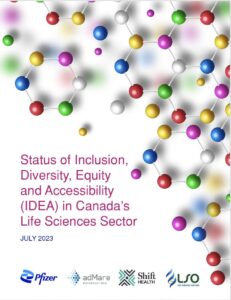Status of IDEA in Canada’s Life Sciences Sector
A report is now available on the Status of Inclusion, Diversity, Equity and Accessibility (IDEA) in Canada’s Life Sciences Sector.
In addition to being the right thing to do, integrating IDEA in life sciences organizations is a powerful way to help this Canadian sector lead by increasing creativity, improving performance and strengthening employee engagement. While many life sciences organizations are embedding IDEA, no one knew what was being done to advance IDEA across the sector or how to drive meaningful change. Shift Health and Life Sciences Ontario led a study, funded by Pfizer and adMare BioInnovations, to help fill those gaps.
A national survey of life sciences organizations and focus groups with diverse individuals in the sector were conducted. Dr. Mahadeo Sukhai of the Canadian National Institute for the Blind (CNIB)—the speaker at CASE’s upcoming AGM—contributed to this report by sharing best practices in inclusive survey design and facilitating focus groups.
“This report is a call to action—and the time to act is now. Canada’s life sciences ecosystem will flourish if we empower our single greatest competitive advantage: the creativity, ingenuity and lived experience of our people.
“IDEA is not a box to tick. It’s not a nice-to-have. It’s an imperative. It’s a human rights imperative. It’s a business imperative. And it’s an imperative of leadership.”Dr. Ryan Wiley, President, Shift Health
A national survey of life sciences organizations and focus groups with diverse individuals in the sector were conducted. Dr. Mahadeo Sukhai of the Canadian National Institute for the Blind (CNIB)—the speaker at CASE’s upcoming AGM—contributed to this report by sharing best practices in inclusive survey design and facilitating focus groups.
Recommendations are made in four key areas:
- Talent Development – Advancing inclusive and equitable approaches to recruitment, training and performance management.
- Community and Culture – Building a stronger sense of belonging for all employees in the sector.
- Knowledge – Strengthening understanding and appreciation of the need for and benefits of IDEA initiatives among all employees.
- Leadership – Catalyzing progress in IDEA by building leadership teams that are diverse, competent in IDEA and accountable to IDEA commitments.
Opportunities identified for the life sciences sector include:
- Articulating, documenting and disseminating the case for IDEA.
- Creating and sharing a library of IDEA tools and templates.
- Establishing an IDEA community of practice for leaders.
Results Interesting for Supported Employment Sector
The main barriers to advancing IDEA for both small/medium and large life sciences organizations included:
- Insufficient capacity
- Insufficient knowledge
- Insufficient financial resources
Top supports that would most help to advance IDEA in their organizations were:
- Education/training for senior leaders
- Access to tools and templates
- Engagement with an IDEA consultant
- Education for managers
- Funding (small/medium organizations)
“We are an industry driven by data, and the data are overwhelmingly clear: diverse groups make better decisions.
“Therefore, heeding this report is not only a tremendous cross-sectoral opportunity between industry, academia, government and catalyst organizations to do the right thing, to embrace and accelerate change, it is also a terrific business decision to encourage Canadian life sciences to lead the world.”Gordon McCauley, CEO & President, adMare BioInnovations
In addition, tracking IDEA efforts, including employee demographic data such as disability, is critical to understanding where change has been made and
where improvements are needed.
You can access a news release about the report on the Life Sciences Ontario website.


